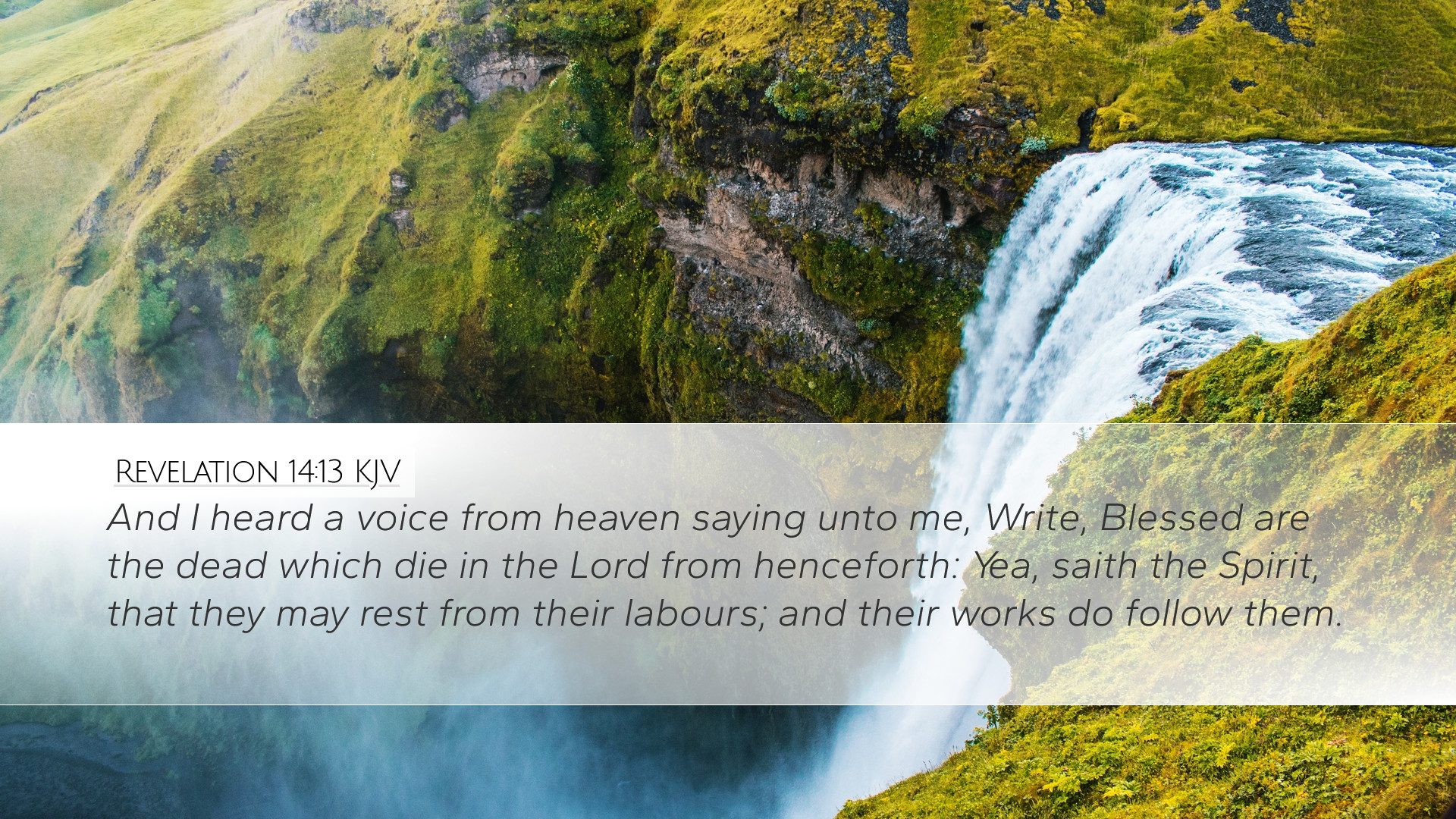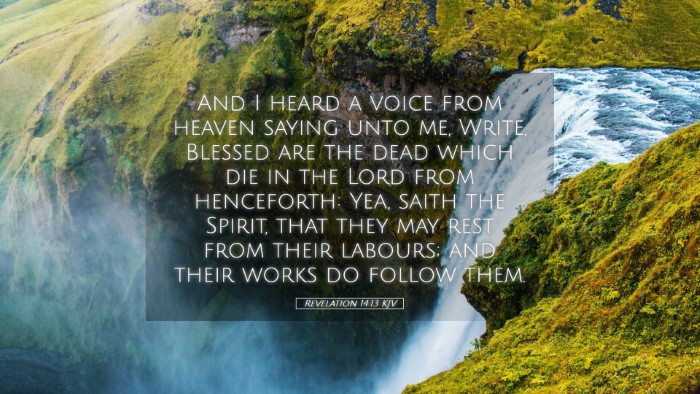Commentary on Revelation 14:13
Verse: "And I heard a voice from heaven saying unto me, Write, Blessed are the dead which die in the Lord from henceforth: Yea, saith the Spirit, that they may rest from their labors; and their works do follow them."
Introduction
The verse Revelation 14:13 serves as a profound proclamation concerning the state of those who die in the Lord. This text has been examined by many esteemed theologians and commentators, such as Matthew Henry, Albert Barnes, and Adam Clarke, who bring depth and insight into its implications. The passage emphasizes the blessedness of those who have departed in faith, the assurance of rest, and the legacy of their works.
Exegesis and Insights
1. The Voice from Heaven
"And I heard a voice from heaven saying unto me..." This introduction highlights the divine source of the declaration. The voice, reminiscent of prophetic announcements in the Scriptures, underscores the heavenly authority behind the message. Matthew Henry notes that such a heavenly proclamation brings comfort to the believers, affirming that their trials on earth do not go unnoticed.
2. The Call to Write
"Write, Blessed are the dead which die in the Lord from henceforth..." The instruction to write signifies the importance of this message. It indicates that the blessing on the dead is one that should be remembered and proclaimed. Albert Barnes points out that this 'writing' serves not only as a record but as a lasting testimony to the blessed state of believers after their earthly demise. Here, it is essential to understand the use of the term "dead" as it refers to the physical state but also contrasts the spiritual vitality of those who are "in the Lord."
3. The Blessing Defined
"Blessed are the dead which die in the Lord..." This phrase contains a profound assurance of the favored position of believers in death. Adam Clarke explains that the “blessedness” signifies a state of happiness and approval from God, emphasizing the continuity of life beyond physical death. The blessedness is not in the act of dying itself but in the relationship with Christ that envelops the believer, providing hope and assurance.
4. The Timing of Blessing
"from henceforth..." The phrase indicates a new phase in God’s redemptive plan, especially as it relates to the trials and tribulations faced during the time of the Revelation. Matthew Henry discusses how this moment marks a significant transition—for those who die in the faith during unprecedented tribulations, a special blessing is announced, signifying God’s grace amid suffering.
5. The Role of the Holy Spirit
"Yea, saith the Spirit..." The affirmation by the Spirit further emphasizes the truth of this declaration. This reflects the cooperative action between the Holy Spirit and heavenly declarations. Albert Barnes highlights that the Spirit's confirmation serves as a reminder that the promise of rest is assured, sustaining the believer's hope and resolve even during life’s tribulations.
6. Rest from Labors
"that they may rest from their labors..." The concept of "rest" signifies cessation from the earthly toil and spiritual struggles endured in life. Adam Clarke expounds that this rest is not mere inactivity but a peaceful state of existence in God’s presence. The rest promised here reinforces the earlier biblical themes of salvation and eternal peace, echoing promises found in the Old Testament (e.g., Isaiah 57:2). It is a rest that follows the believer’s faithful service in Christ.
7. The Works that Follow
"and their works do follow them." This closing statement of the verse indicates an intriguing reality of the believer's legacy. Matthew Henry asserts that the good works done in faith are not forgotten; they accompany the believer in the afterlife. It underscores a significant biblical principle that faith without works is dead (James 2:26), and yet, as we rest in Christ, the fruits of our labor remain as eternal testimonies of our faithfulness. Albert Barnes elucidates this by suggesting that the rewards in heaven are closely linked to the works that are done in this life.
Theological Implications
This verse encapsulates several theological themes crucial for a deeper understanding of eschatology, soteriology, and practical Christian living:
- Assurance of Salvation: The assurance that those in Christ have a blessed hope after death is fundamental for pastoral ministry and the encouragement of believers.
- The Consequence of Works: Understanding that works have eternal significance emphasizes the believer's call to faithful living, motivating evangelism, and discipleship.
- The Role of the Holy Spirit: Recognizing the Holy Spirit's role in affirming truth is vital for discerning God’s voice amidst confusion, particularly during tumultuous times.
- Purpose in Suffering: The promise of rest reassures Christians facing persecution that their labors are not in vain, infusing strength and perseverance in hardships.
Conclusion
Revelation 14:13 presents a deeply encouraging message for believers, emphasizing the blessedness of those who die in the Lord. Through the insights of notable commentators, we see the multifaceted nature of this passage—balancing mystery, assurance, and the acknowledgment of a purposeful life lived in faith. For pastors, students, theologians, and scholars, this verse invites a rich exploration of Christian hope and the eternal impact of a life devoted to Christ.


